ARTICLE AD BOX

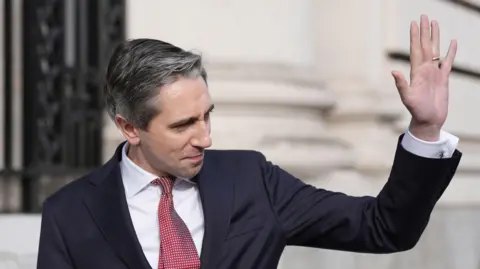 PA Media
PA Media
Simon Harris is expected to call an election later on Friday
The taoiseach (Irish prime minister) is expected to ask Irish President Michael D Higgins to dissolve the current Dáil (lower house of the Irish parliament) later.
Under Irish law, once the Dáil is dissolved an election must be held within 30 days.
Earlier this week, Simon Harris indicated a preference for a polling day in the Republic of Ireland's general election on 29 November.
He is the leader of Fine Gael and heads a coalition government alongside Fianna Fáil and the Green Party.
Harris, who is attending a summit in Hungary, will return to Dublin on Friday afternoon to make a statement at government buildings.
The taoiseach will then travel to the president's residence - Áras an Uachtaráin - to request that Higgins dissolves the Dáil.
On Thursday, politicians who make up the 33rd Dáil met for the final time ahead of the snap election.

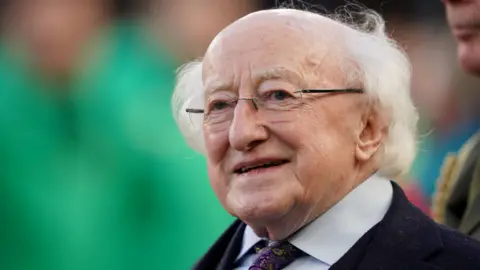 PA Media
PA Media
Harris will ask the Irish President Michael D Higgins to dissolve the Dáil on Friday afternoon
In this general election, the number of TDs (MPs) seeking election and the number of constituencies will increase following a 2023 review.
There are now 43 Dáil constituencies - an increase of four from 2020 - which will elect between three and five TDs each.
A total of 174 TDs will be selected, meaning that 88 TDs will be required to form a majority government.
Speaking about the election on Thursday, Fianna Fáil leader Micheál Martin said it was his party's objection to lead the next government.
"The first issue is to win seats and that’s going to be challenging, it’s a very fragmented political system with many parties and independents running," he said.
"Our aim is to win the largest number of seats and then we’ll take it from there."
'There you go, clarity'
A general election must be called in the Republic of Ireland before the term ends on March 2025.
The taoiseach has faced persistent questions over the timing of the election for months, previously sidestepping requests to provide a definitive timeline.
However, on Wednesday, he signalled his hope for a polling day on 29 November saying: “There you go, clarity.”
He went on to say: “I look forward to the weeks ahead and to asking the people of Ireland for a mandate.”
The coalition government had agreed not to call an election until the Finance Bill had passed, enacting tax cuts which capitalised on surplus corporation tax incomes from global tech and pharma groups.
Who is in power at the minute?
Three parties - Fine Gael, Fianna Fáil and The Green Party - make up the coalition government in the Republic of Ireland.
Voters last went to the polls in February 2020 where Fianna Fáil won the most seats (38).
But the party fell short of a majority and entered into negotiations with Fine Gael, who led the then-outgoing government, and the Green Party.
An agreement on a coalition deal was reached four months later, having been delayed due to the coronavirus pandemic, in June 2020.

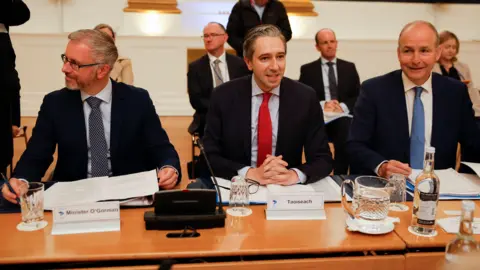 PA Media
PA Media
The Green Party's Roderic O'Gorman (left), Simon Harris and Micheál Martin currently make up the leaders of Ireland's coalition government
As part of the agreement, the role of taoiseach was to be swapped between Fianna Fáil and Fine Gael mid-way through the five-year term.
Martin held the top role until December 2022, before then-Fine Gael leader Leo Varadkar took on the reigns.
Varadkar announced he was resigning from the role earlier this year. Harris then took over as taoiseach in April after winning the party's leadership contest.
Sinn Féin, who recorded a historic result in the 2020 election after winning 37 seats, currently lead the opposition.
Its leader Mary Lou McDonald had described the outcome as "something of a revolution in the ballot box".
A number of other parties, such as Labour, Social Democrats, People Before Profit, Aontú and independents, also make up the opposition.
Analysis by BBC News NI's political editor Enda McClafferty

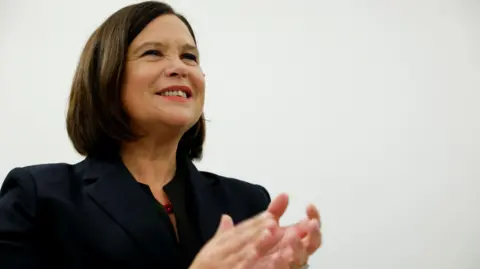 Reuters
Reuters
Sinn Féin President Mary Lou McDonald launched the party's Dublin Central election campaign candidates on Thursday
"Bring it on" was the message from Sinn Féin leader Mary Lou McDonald as she launched her constituency campaign to a packed room in a Dublin city centre hotel on Thursday night.
She was setting out her party’s strategy for the forthcoming election and building a campaign around seven key areas, including building extra homes, fixing the health service, childcare, universal health credit and Irish reunification.
She says she wants to build a coalition of the left and remove Fine Gael and Fianna Fáil both from the equation.
Fiery exchanges during the last Dáil sitting on Thursday offered voters an insight into what voters can expect over the next three weeks.
It’s going to be intense and, as we know, campaigns in the Republic of Ireland can turn pretty quickly.
Very often what is the case is that the position that the parties are in at the polls at the start of the campaign is not necessarily the position they will be in at the end.
In 2020 Sinn Féin was in the same position where they were third in the poll rating, but then they jumped to being the most popular party whenever all the votes were counted.
We know a lot has happened since then in terms of the difficulties the party has faced, not least around immigration and that will still be a problem for them when it comes to speaking to people on the doorsteps.
Selling a message is one thing, defending positions is another.
How big a role will the economy play?
Analysis by BBC News NI economic and business correspondent John Campbell
The two larger government parties – Fianna Fáil and Fine Gael – can tell the voters they have presided over an economy which is one of the fastest growing in Europe, the employment market has never been stronger, and there is a budget surplus.
It’s likely cost of living will feature in this campaign, and to some extent, the coalition have tried to pre-empt this with their pre-election budget in which they extended one-off cost of living payments into a third year.
But nonetheless, that will be one area of attack for opposition parties.
Sinn Féin will be very keen to bring this election onto the ground of housing.
They will continue to make the point that however strong the economy is, people still cannot get housing at a reasonable cost.

 5 months ago
19
5 months ago
19

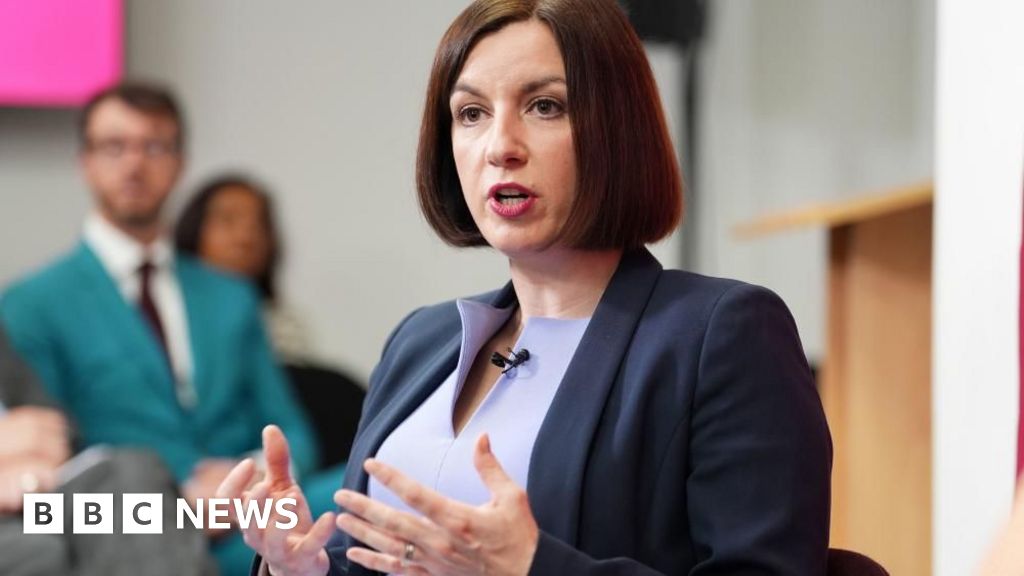
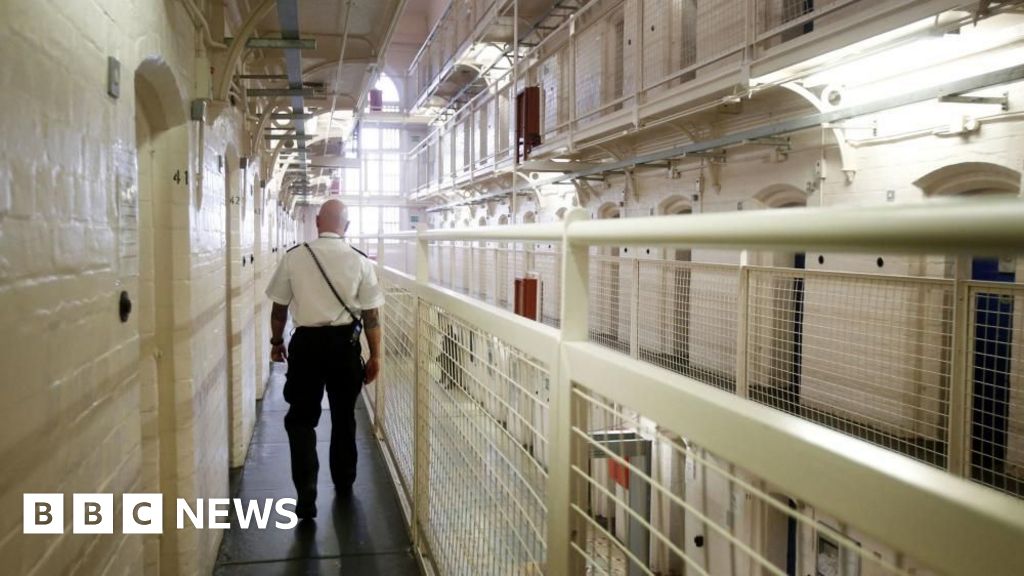





 English (US) ·
English (US) ·